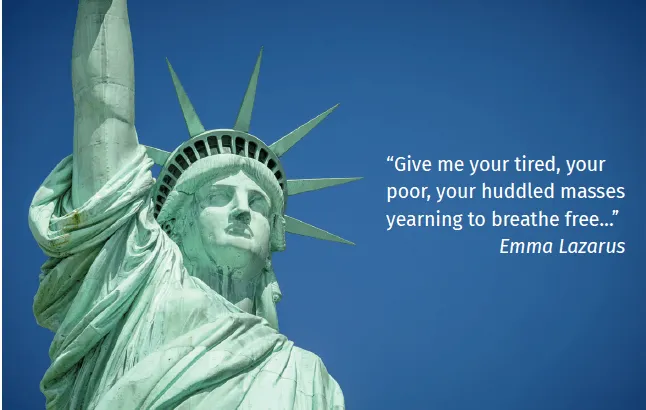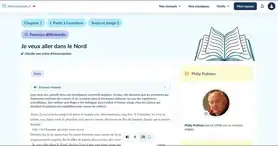Unit 1
Reading corner
Wake up, America!
Ressource affichée de l'autre côté.
Faites défiler pour voir la suite.
Faites défiler pour voir la suite.
Text document
[...] America's high-quality universities are among the key sources of its greatness. Every year, top students from all over the world vie for access to graduate and undergraduate programs in the US, and American universities occupy most of the top spots in global rankings. Moreover, the basic research conducted at US universities has been a primary driver of innovation and economic growth, as well as the source of a disproportionate share of Nobel prizes.
America's universities cater to1 a wide variety of students, researchers, and other economic actors. The top research universities attract not just the best and the brightest students, but also clusters2 of high-tech companies, such as those in Silicon Valley and Boston. [...] With competition between public and private institutions ensuring a high level of excellence across the board, higher education in the US has long been a major export industry. According to Catherine Rampell of the Washington Post, US “educational exports are about as big as [US] total exports of soybeans3 , coal and natural gas combined.” With three times more foreign students studying in the US than Americans studying abroad, the US higher-education sector contributed a net surplus of around $34 billion to the US current account in 2017.
Foreign students' attendance at US universities confers many advantages. For starters, these students usually pay full tuition rates4 (especially at the undergraduate level), which allows universities to allocate more financial aid for Americans who need it. At the graduate level, more than half of those enrolled in computer-science and engineering programs are foreign-born and could remain in the US to work. Without them, America's high-tech companies would face an even greater talent shortage5 than they already do.
Finally, the presence of foreign students enriches the university experience for Americans themselves. And, as an added soft-power bonus, many foreign students return home as staunch6 supporters of America, and can influence their country's foreign-policy positions accordingly.
Until 2016, the number of foreign students studying in the US had been rising, but it then fell by around 3% in 2016, and by 6.6% in 2017. And initial reports indicate that it dropped7 by another 7% in 2018. Part of this decline is probably due to the fact that other countries have recognized the importance of hosting top-quality universities, and are working harder to attract foreign students and retain their own. [...]
It has become harder to obtain a student visa, and foreign students already enrolled in US universities have had to worry about whether they will be able to travel to and from their home country. [...]
To be sure, there are also problems within the US higher-education sector itself. Complaints about rising tuition and fees, for example, have been building for years. What is often forgotten, though, is that the knowledge one gains from leading universities has also become more valuable, particularly in fields such as biochemistry, computer science, and environmental studies.
Put another way, one rarely hears complaints about the price of a Tesla compared to that of a Ford, or about the price of a Ford today compared to that of a Model T in the 1920s. Insofar as tuition costs have risen, a large part of it is almost certainly due to advances in knowledge, and thus the quality of a four-year degree8. Just as a car today is more valuable than one from 100 years ago, so, too, is a four-year degree.
As a partial solution, colleges and universities have increased their financial aid to offset the “sticker price” (full tuition charges) for more students. In fact, some universities now spend as much as half of their budgets on financial aid. But, again, the more foreign students there are to pay full tuition, the smaller this burden9 will be. [...]
With other countries attempting to beef up10 their own universities, the US should be increasing its efforts to attract foreign students. Doing so would cost the US nothing, attract the talent its economy needs, and make higher education more US nothing, attract the talent its economy needs, and make higher education more affordable11 for more Americans.
America's universities cater to1 a wide variety of students, researchers, and other economic actors. The top research universities attract not just the best and the brightest students, but also clusters2 of high-tech companies, such as those in Silicon Valley and Boston. [...] With competition between public and private institutions ensuring a high level of excellence across the board, higher education in the US has long been a major export industry. According to Catherine Rampell of the Washington Post, US “educational exports are about as big as [US] total exports of soybeans3 , coal and natural gas combined.” With three times more foreign students studying in the US than Americans studying abroad, the US higher-education sector contributed a net surplus of around $34 billion to the US current account in 2017.
Foreign students' attendance at US universities confers many advantages. For starters, these students usually pay full tuition rates4 (especially at the undergraduate level), which allows universities to allocate more financial aid for Americans who need it. At the graduate level, more than half of those enrolled in computer-science and engineering programs are foreign-born and could remain in the US to work. Without them, America's high-tech companies would face an even greater talent shortage5 than they already do.
Finally, the presence of foreign students enriches the university experience for Americans themselves. And, as an added soft-power bonus, many foreign students return home as staunch6 supporters of America, and can influence their country's foreign-policy positions accordingly.
Until 2016, the number of foreign students studying in the US had been rising, but it then fell by around 3% in 2016, and by 6.6% in 2017. And initial reports indicate that it dropped7 by another 7% in 2018. Part of this decline is probably due to the fact that other countries have recognized the importance of hosting top-quality universities, and are working harder to attract foreign students and retain their own. [...]
It has become harder to obtain a student visa, and foreign students already enrolled in US universities have had to worry about whether they will be able to travel to and from their home country. [...]
To be sure, there are also problems within the US higher-education sector itself. Complaints about rising tuition and fees, for example, have been building for years. What is often forgotten, though, is that the knowledge one gains from leading universities has also become more valuable, particularly in fields such as biochemistry, computer science, and environmental studies.
Put another way, one rarely hears complaints about the price of a Tesla compared to that of a Ford, or about the price of a Ford today compared to that of a Model T in the 1920s. Insofar as tuition costs have risen, a large part of it is almost certainly due to advances in knowledge, and thus the quality of a four-year degree8. Just as a car today is more valuable than one from 100 years ago, so, too, is a four-year degree.
As a partial solution, colleges and universities have increased their financial aid to offset the “sticker price” (full tuition charges) for more students. In fact, some universities now spend as much as half of their budgets on financial aid. But, again, the more foreign students there are to pay full tuition, the smaller this burden9 will be. [...]
With other countries attempting to beef up10 their own universities, the US should be increasing its efforts to attract foreign students. Doing so would cost the US nothing, attract the talent its economy needs, and make higher education more US nothing, attract the talent its economy needs, and make higher education more affordable11 for more Americans.
1. (here) host
2. groups
3. soya beans
4. university payments
5. lack, when there is not enough
6. strong, firm
7. decline, fall
8. diploma
9. load, weight
10. augment
11. not expensive
Wake up, America!
Ressource affichée de l'autre côté.
Faites défiler pour voir la suite.
Faites défiler pour voir la suite.
Questions
a) What kind of people are attracted by the US intellectual opportunities?
b) What do you learn about the proportion of foreign students in US universities?
c) Do foreign students pay the same tution fees as Americans?
d) Who benefits from the arrival of foreign students?
b) What do you learn about the proportion of foreign students in US universities?
c) Do foreign students pay the same tution fees as Americans?
d) Who benefits from the arrival of foreign students?
e) What impact do foreign students have in their home country when they go back?
f) Is the number of foreign students increasing? Why?
g) What is the point of comparing a degree to a car?
h) What do universities do to attract and keep foreign students?
f) Is the number of foreign students increasing? Why?
g) What is the point of comparing a degree to a car?
h) What do universities do to attract and keep foreign students?
Ressource affichée de l'autre côté.
Faites défiler pour voir la suite.
Faites défiler pour voir la suite.
Picture


Ressource affichée de l'autre côté.
Faites défiler pour voir la suite.
Faites défiler pour voir la suite.
If you want to take a shot at the Land of Opportunity or want to know more about how to get a green card or to get a H1B visa go to these sites:
Ressource affichée de l'autre côté.
Faites défiler pour voir la suite.
Faites défiler pour voir la suite.
Your time to shine!
Ressource affichée de l'autre côté.
Faites défiler pour voir la suite.
Faites défiler pour voir la suite.
1. You are considering immigrating to the US and feel concerned about the immigration policies and evolution. React to this article by posting a comment on the newspaper's website. (180 words)
2. You write a letter to send along with your application to get a H1B work and student visa. Be convincing! (180 words)
Ressource affichée de l'autre côté.
Faites défiler pour voir la suite.
Faites défiler pour voir la suite.
Explain who you are and why you want to go to the US, what you could bring to the US and what this experience can provide you with.
Explain to what extent you feel concerned by this subject. Justify.
Use you knowledge about Brain Drain to argue your cause.
Explain to what extent you feel concerned by this subject. Justify.
Use you knowledge about Brain Drain to argue your cause.
Une erreur sur la page ? Une idée à proposer ?
Nos manuels sont collaboratifs, n'hésitez pas à nous en faire part.
j'ai une idée !
Oups, une coquille

